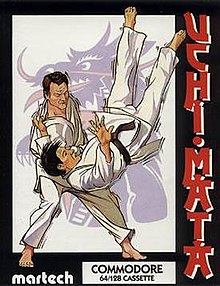Uchi Mata (video game)
| Uchi Mata | |
|---|---|
 | |
| Developer(s) | Andy Walker Paul Hodgson |
| Publisher(s) | Martech Games |
| Platform(s) | Commodore 64, Amstrad CPC, ZX Spectrum, MSX[1] |
| Release | 1986 |
| Genre(s) | Sports, Fighting |
| Mode(s) | Single-player, multiplayer |
Uchi Mata (also known as Judo Uchi Mata) is a judo fighting game released for various home computers by Martech Games. It was promoted[2] by British Olympic judoka Brian Jacks, who also acted as technical advisor.[1] It is the first fighting game to feature counters and hidden moves.[3]
Summary
This computer game is notable for its control scheme that allowed users to perform various fighting techniques.[3]
A similar control scheme would be used a year later in Capcom's arcade game Street Fighter. Another feature that would later appear in Street Fighter was the inclusion of hidden moves: moves that were not included in the instruction manual that players would have to find on their own.[4]
Unlike most other martial arts games the approach is more important than the actual kick/shove/punch etc., since the player must first grab the opponent and subsequently do an up/down/left/right combo (about ten different options to choose from) on the joystick before anything happens. The most powerful move is called uchi mata and if performed correctly it will knock out the opponent no matter how much strength he may have left. A nice little detail here is that the opponent's eyes (really just two black dots, and only one since the game is a side scroller) close/disappear when he lands on his back after a knock out-move, as if to say 'he's gone'. Punching is not allowed, yet there's one available punch in the game, and if executed the player is immediately disqualified.
There are six to seven opponents in each level and you can continue play working your way up the 'Dan' ratings.
Reception
| Publication | Score |
|---|---|
| Crash | 36%[4] |
| Computer and Video Games | 30/40[5] |
| Sinclair User | 7/10[7] |
| Your Sinclair | 7/10[6] |
| Zzap!64 | 89%[8] |
The game received mixed reviews. The animation was praised by Sinclair User, but Crash criticised the controls. CVG said it was realistic but difficult. Phil South of Your Sinclair said "Uchi Mata is quite good fun, but it seemed a bit unfinished to me. Shame, 'cos with a bit of tickling up this could have been a surefire hit."
Uchi Mata sold poorly[2] and it was soon re-released at budget price by Alternative Software.[9] Alternative renamed the game as according to managing director Roger Hulley "the name didn't click, so we put the sport first and our title is called Judo Uchi Mata, which really sells".[9] Judo Uchi Mata reached the number nine in the UK video games charts in Autumn 1987.[10]
References
- ^ a b "Martech Arts". Computer Gamer. No. 20. Argus Specialist Publications. November 1986. p. 6. Retrieved 6 February 2022.
- ^ a b "The Personality People – Martech Games". Retro Gamer. No. 133. Imagine. 11 September 2014. pp. 46–51.
- ^ a b Snape, Joel (10 August 2014). "Grappling is one of the oldest sports in the world - so why can't video games do it properly?". Eurogamer. Gamer Network. Retrieved 11 August 2014.
- ^ a b "Uchi Mata". Crash. No. 39. Newsfield. 26 March 1987. p. 114. Retrieved 6 February 2022.
- ^ The Great Escape
- ^ "Uchi Mata". Archived from the original on 2016-04-05.
- ^ Uchi Mata
- ^ "Zzap! Test". December 1986. p. 21.
- ^ a b "Now It's BMX Ninja – What's In A Name At Alternative". Crash. No. 49. Newsfield. 28 January 1988. p. 8. Retrieved 6 February 2022.
- ^ "Top Twenty". Popular Computing Weekly. No. 40. Sunshine Publications. 9 October 1987. p. 35. Retrieved 6 February 2022.
External links
- Uchi Mata at SpectrumComputing.co.uk
